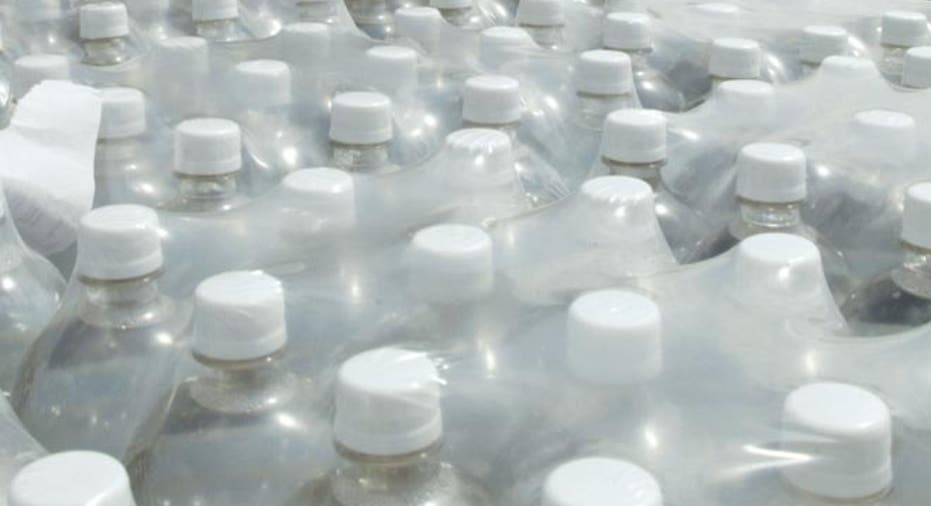Bottled H20: The Good, The Bad & The Ugly

It’s currently the best-selling beverage in the country—and with global consumption rising—bottled water is averaging a growth rate of 6% per year since 2008 with sales expected to reach about 233 billion liters this year, overtaking soda by about 1.3%, according to market research group Canadean.
Pepsi’s (NYSE:PEP) Aquafina and Coke’s (NYSE:KO) Dasani are the leading the pack, making up 24% of the bottled water industry in the United States.
“People are shifting away from caloric and artificial drinks like soda. They know it’s not good for them and they’re going towards water instead,” says Ralph McRae, CEO of Leading Brands Inc.(NASDAQ:LBIX), a North American healthy beverage company and Maker of HappyWater.
But if you’re spotted drinking from one—you may get some glares.The plastic water bottle industry has been a lightning rod because not enough consumers are recycling. San Francisco even made moves when they banned the sale of them last year.
The average American consumed 167 disposable water bottles last year, but only recycled 38 of them, according to an anti-plastic bottle campaign Ban the Bottle. This means that 38 billion water bottles--more than $1 billion worth of plastic – were wasted last year.
“Consumers are used to purchasing convenience beverages on the go and the efforts to change consumer behavior with refillable bottles have not been sufficient to counteract the health driven trend,” says Jeremy Adams, Vice President of Marketing for Boxed Water, an eco-friendly and BPA-free packaged water company.
According to Ban the Bottle, more than 17 million barrels of oil are used annually (enough to fuel 1.3 million cars a year) to meet American’s on-the-run water needs.
“I don’t think there’s an issue with using plastic, I think the issue comes when people don’t recycle and then the bottle ends up in the ocean and then it takes about a thousand years to biodegrade. That’s the problem. PET plastic is extremely recyclable and of high value, if disposed of properly," says McRae.
PET stands for polyethylene terephthalate, which is a form of polyester (just like the clothing fabric) and is currently used to mold plastic water bottles. It contains no Bisphenol A— better known as BPA — an industrial chemical that was first introduced in the 1960’s to make certain plastics. BPA also caused quite the uproar among drinkers when scientists linked exposure to diseases like cancer and diabetes.
“PET bottles are at least 5-10X cheaper for the manufacturer than more sustainable packaging. From a consumer perspective, water in PET plastic bottles can be purchased very inexpensively in bulk packs, and this represents a large portion of the bottled water market today,” says Adams, who hopes consumers turn to paper-based alternatives, like Boxed Water.
Even the retail industry is jumping into action. Banana Republic, which is owned by Gap Inc. (NYSE:GPS) recently partnered with Boxed Water and are featuring the eco-friendly drink in eleven of their flagship stores.
“We’re excited to partner with Boxed Water to raise awareness around sustainability,” says Aimee Lapic, SVP and GM of Customer Experience at Banana Republic.
Adams says he hopes the partnership helps educate consumers on the power of small every-day decisions that can help reduce your environment footprint.
McRae disagrees and thinks we should be using a corn-based fuel instead of fossil fuels to make plastic water bottles.
“In my opinion, Tetra Pak and waxed paper (packaging used to make juice boxes) are worse than plastic bottles. They won’t tell you that, they don’t go into the analysis of it but waxed cardboard isn’t easily recyclable. That’s the hard truth about it. Regular cardboard, however, is readily recyclable,” says McRae, who uses 85% less plastic than conventional bottled water in its WaterBox.
Boxed Water says they don’t use Tetra Pak (which is a brand of packaging) or waxed cardboard and they are not the same category as juice boxes.
“The entire carton is recyclable and 100% BPA free,” says Adams. “While there is opportunity to improve easy recycling access and compliance across all packaging formats (including PET), we believe that our unique combination of materials and business's practices make Boxed Water a significantly better alternative to PET plastic bottles.”
While there isn’t any hard or fast answer to the growing bottled water controversy, one thing still remains true, if you are drinking from plastic, make sure you recycle. It does make a difference.



















